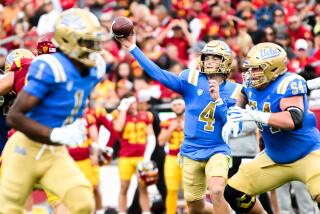Just for fun? No, serious video game players seek fame and money
Arriving in the United States from his native China as a young boy, Fan Yang appeared to be on the fast track to realizing the American dream. He mastered English and excelled in school. After rolling through La Jolla High with an A-plus average, he earned an economics degree at UC Berkeley.
At 23, he’s now a data research analyst in San Francisco.
But his job is only a part-time sideline. “The rest of my time,” he said, “I’m doing the whole video game thing.”
Yang is a professional video game player. Next weekend, he’ll lead the top-ranked American team to BlizzCon, a two-day competition in Anaheim. His five-person squad, Cloud 9, hopes to emerge as “Heroes of the Storm” world champs, triumphing on an online battlefield crammed with monsters, wizards, assassins and fireballs.
If you think this is a bizarre career path, you’re not alone. Just ask Yang’s parents.
“They definitely are having a lot of trouble understanding what I’m doing,” Yang said. “They want me to get a good job.”
Yet the best pro gamers make more money than some recent college graduates. Forbes reported that the winners of video gaming tournaments in 2012 reaped more than $30 million.
The “e-Sports Earnings” website maintains that there has been $49.5 million in purses to date in 2015, with two Americans, Saahil Arora and Peter Dager, each winning $1.9 million. At BlizzCon, where matches will determine the world champions in four different video games, the prize money is $1.25 million. Of that, $500,000 will go to “Heroes of the Storm” competitors, with the five people on the first-place team dividing $200,000.
“We are competing for fame and money,” Yang said.
Crude video games first appeared in the 1950s. But as technology improved, the games emerged as a popular pastime in the ‘70s and ‘80s, buoyed by the likes of “Pac-Man” and “Space Invaders.” With the rise of personal computers, the games have come home.
As Internet connections gained speed and reliability, it became possible to compete with others in distant locations, including other countries.
As an industry, video gaming is not kid stuff, with annual revenue of $22 billion. The players, too, are maturing. Of the 150 million American players, the average age is 35. Most are guys, but the gender gap is narrowing.
Females now account for 44% of all gamers. In fact, women 18 and older outnumber teenage boys by better than 2-to-1.
Yang first discovered video games when he was 7, playing “StarCraft: Brood War” for hours at a time.
“I was probably pretty bad,” he said.
At Berkeley, Yang joined a campus team and entered a college “StarCraft 2” competition. His team won, each player clearing about $6,000. He entered more contests and won thousands more.
The money was welcome, and eased some family tensions.
“That placated them,” Yang said of his parents, “a little bit.”
At Berkeley, Yang juggled his studies with endless rounds of gaming. He was intent on becoming an internationally ranked player.
“I wanted to get noticed,” he said, “and get picked up by a major team.”
In April, he led a five-person Berkeley team to victory in “Heroes of the Dorm,” a national intercollegiate competition. For defeating Arizona State University in the finals, the Berkeley players each received a year’s tuition.
That was Yang’s last stop on the college circuit. In June, he was recruited by a powerhouse professional team, Cloud 9. It was the equivalent of being signed by a major league team.
In September, Cloud 9 won the U.S. “Heroes of the Storm” championship, squeaking though the finals with a narrow 3-2 win over Tempo Storm.
Last week, the international finals began with first-round matches in Burbank. On Wednesday, Cloud 9 was pitted against Logi GIA, a Taiwanese team that the BlizzCon site described as notable for its “quirky picks and all-in attitude.”
The site’s take on Cloud 9: “Standard and consistent, but surprising.”
Cloud 9 won the match, 2-0.
On Friday, the team will face the European champ, Team Dignitas.
The finals are scheduled for Saturday. Thousands of fans will crowd the Anaheim Convention Center (admission starts at $199) to see the action in person. Many more will watch via streaming video (virtual tickets are $39.99).
Karen Lai, 21, Yang’s girlfriend who is also a player, plans to be in the audience.
“It’s kind of like a weird thing,” she said. “This is one of the first generations to be playing video games for a living, so a lot of people don’t understand.”
Still, she’s not surprised by Yang’s success.
Peter Rowe is a staff writer for the San Diego Union-Tribune.
More to Read
Sign up for Essential California
The most important California stories and recommendations in your inbox every morning.
You may occasionally receive promotional content from the Los Angeles Times.










